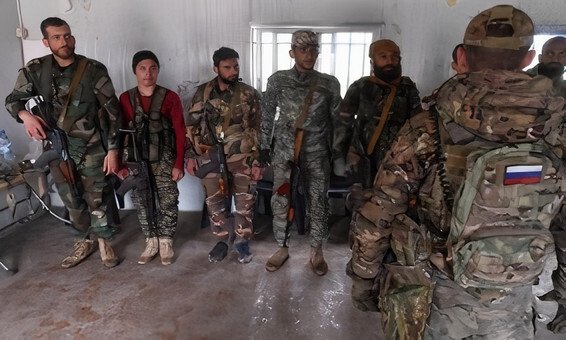© Turkuvaz Haberleşme ve Yayıncılık 2026
Russia’s Wagner group is preparing to send 300 Syrian fighters from the Bashar Assad regime-controlled Deir el-Zour to fight alongside Libyan putschist Gen. Khalifa Haftar, security sources on the ground stated on Monday.
Sources told Daily Sabah that the new Syrian mercenary group is comprised of fighters loyal to the regime, Iran-backed foreign groups and volunteers from Assad’s army.
The group is currently receiving training in Syria and will be sent to eastern Libya’s Benghazi toward the end of April.
The sources stated that the sending of new Syrian mercenaries to Libya amid efforts for lasting peace and stability in the war-torn country indicates that Haftar could not stomach being thrown into the background and still wants to take part in the leadership of Libya.
Russia has been one of the biggest supporters of the warlord along with France, Egypt and the United Arab Emirates (UAE) who also backed Haftar’s offensive on the capital Tripoli in 2019.
Formed back in 2014 in Ukraine and owned by businessperson Yevgeny Prigozhin, the Wagner Group is intensely involved in several conflicts.

The group made its presence most pronounced in Syria and Libya, where Russia actively participated in the civil war and reportedly used the Wagner Group as its proxy in the region. Although Russia officially does not acknowledge any cooperation with the Wagner Group, the reports from the field prove otherwise.
In Libya, Russia has backed Haftar in his fight to seize power from the United Nations-recognized Government of National Accord (GNA), which preceded the newly elected interim government under Abdul Hamid Dbeibah.
The United States Africa Command (AFRICOM) on July 24, 2020, accused Russia of “playing an unhelpful role in Libya by delivering supplies and equipment to the Wagner group.”
The Wagner Group has 2,000 personnel in Libya, according to the command. Currently, the group has bases in the cities of Sirte and Jufra.
The deadline for the departure of foreign mercenaries from Libya under the October cease-fire passed in January but calls to accelerate the process continue as no movement has been announced or observed on the ground.

Dbeibah in Turkey for talks
Meanwhile, Libyan Prime Minister Dbeibah and a delegation of ministers visited Turkey on Monday to discuss the recent developments and the situation in the North African country.
Libya's new unity government was sworn in on March 15 from two warring administrations that had ruled eastern and western regions, completing a smooth transition of power after a decade of violent chaos.
Dbeibah will hold a two-day visit upon President Recep Tayyip Erdoğan's invitation and the two will chair the first meeting of the Turkey-Libya High-Level Strategic Cooperation Council in Ankara.
At the meeting to be held with the participation of relevant ministers, all aspects of Turkey-Libya relations will be discussed and steps that can be taken to further improve cooperation will be evaluated.
Turkey has said that Turkish firms will play an active role in rebuilding the war-torn country.
In 2019, Ankara signed a maritime demarcation agreement with the GNA over the Eastern Mediterranean and a military cooperation accord under which Turkey sent military advisers and trainers to Tripoli.
Greece, which opposes the maritime agreement between Tripoli and Ankara, called for the accord to be canceled last week, as it reopened its embassy in Libya after seven years.
Dbeibah, selected through a U.N.-led process, has said economic deals between the GNA and Turkey should remain.
